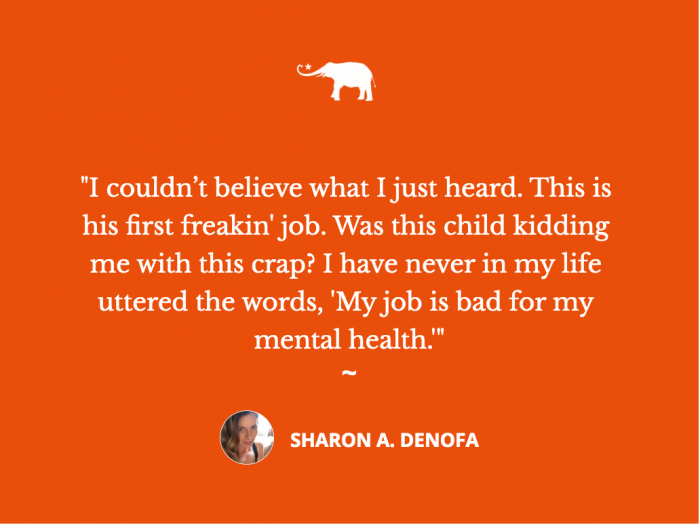~
My 16-year-old son, who just received his license, was required to find a job if he wanted to drive.
Those are the simple house rules. If you want to drive, you’ll have to work and financially pay for your insurance, gas, and car maintenance.
He was able to stay at his employment for a matter of six months. Then one day, when he came home in tears and said he just couldn’t do it any longer, I was immediately worried. When I asked what had happened, his response was quick, steady, and to the point—like he was prepared to defend himself.
“It’s not good for my mental health.”
Wait, what? I couldn’t believe what I just heard. This is his first freakin’ job. Was this child kidding me with this crap? I have never in my life uttered the words, “My job is bad for my mental health.” You land a job, work, and get paid. There’s nothing else to discuss.
Why does he feel mentally incapable of actually working? I paused and really thought about how he felt.
Was his job really not good for his mental health? Do other people feel that their job is not good for their mental health, too?
I began to examine my employment history and really dig into each and every job. I wanted to feel what my son was feeling. I wanted to help him through this experience; I wanted to relate. I wanted to give him the advice to help him through this ordeal.
He needed some kind of guidance because he couldn’t possibly go into adulthood thinking that a job was not good for his mental health. How does one become a successful part of society with these thoughts?
The fact is, workplace stress is not uncommon. This is sad but true. Many people feel work is stressful, but the unsettling thing is that when it’s left unchecked, it can lead to depression and anxiety.
If work causes you sadness, anxiety, or unexplained crying, you may be experiencing depressive symptoms at work. When depression and stress begin, they can create debilitating negative emotions and result in lower productivity, inability to concentrate on work, and strained relationships with coworkers.
Employers are supposed to have some sort of mental health strategy in place; however, I don’t recall any of my employers having anything like this. I’ve never even heard of such a thing.
Are employers really looking out for their employees? Or are they the ones causing all the stress and anxiety?
But since I feel it’s mostly up to us to keep our mental health in check, I created a kickass plan that can help us fall back in love with our jobs:
1. Practice having a positive attitude.
No matter what the situation is, I always look at the positive side—I might even have to fake it at times. Put out those positive vibes and they come back to us—always.
We can find something and anything to be positive about. It could be simple like steady income, a friendship with a coworker, insurance, or the overall meaning of how we are contributing to the world with our job. If we show up every day with a positive attitude, it’s going to take a lot more to knock us down. Eventually, we will see the difference in our performance.
2. Use the weekends to rejuvenate from the workweek.
For example, once I walk out of the office, I literally shut my brain off. I won’t put another thought into what I should or could have done. The week is over.
I clock out and enjoy every bit of my weekend with my family, friends, and, most importantly, myself. Whatever needs to be done at work can wait until Monday. End the f*cking week.
We shouldn’t waste time on Sunday nights worrying about the upcoming week. Of course, I do plan ahead for the upcoming week so that I’m ready to dive into the week. However, I plan fun things like what to wear to look and feel fabulous, or practice meal prepping so I could eat healthy food.
What needs to be done the following week will get worked on when I walk in on Monday morning.
3. Get sufficient sleep.
I need to sleep. Whenever I feel really stressed from the workday, I squeeze an exercise class in between my busy evening. The class helps release the stress of the day and relaxes my mind and body for a restful sleep.
We must not worry about work until we walk in the next morning. There is nothing we can do about it while at home, so it’s best to wait until the next day.
4. Save your sick days for the big stuff.
If I am unable to leave my bed, that is one thing. But for the common cold and headache-type stuff, I still go in. I am 1,000 percent devoted to my job. I show up not just for them but for myself. Employers love devoted employees; it goes a long way with the big guys.
5. Recognize who you are at work.
Be confident in who you are, and know your strengths and weaknesses. If you struggle in one area, seek assistance and learn how you can better yourself. Use your strengths to assist others who may need help.
6. Know your purpose.
We work to support our families. We bust our butts off to provide a home for our loved ones. We put in the long hours to feed our children. These are the things that should matter the most to us.
I work because I have so many people depending on me once I get home. But most importantly, I know that they’re worth it.
It is true, however, that there will always be jobs that are toxic. No matter what we do, we are just not going to fall in love with them, and that is okay. If you can’t create a happy place within your job, know that it’s time to move on and look for another job. Our mental health is important too.
Maybe our jobs are not always good for our mental health, but sometimes, we have the power to turn that around and make it a place where we can grow, contribute, and be financially rewarded for the hard work that we put out.
We all have something waiting for us that makes it worth it in the end. So, if possible, let’s fall in love with our job. If we can do that, it will love us in return.









Read 26 comments and reply